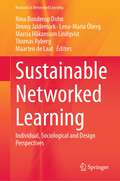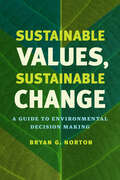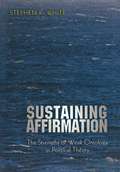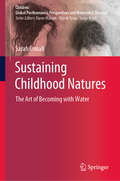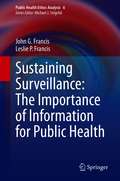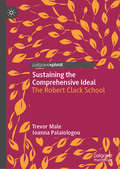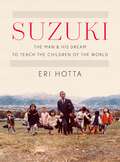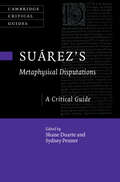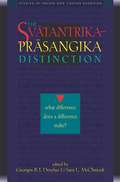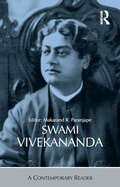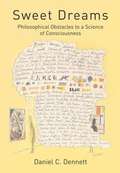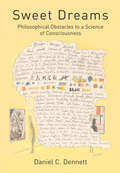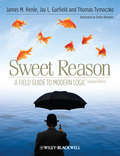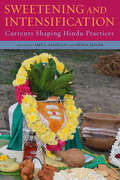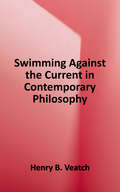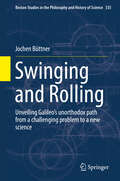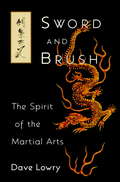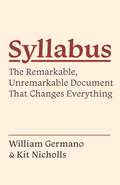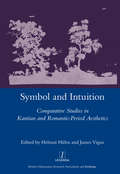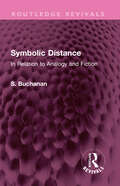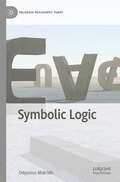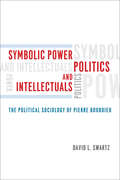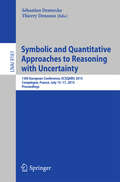- Table View
- List View
Sustainable Networked Learning: Individual, Sociological and Design Perspectives (Research in Networked Learning)
by Thomas Ryberg Maarten De Laat Nina Bonderup Dohn Jimmy Jaldemark Lena-Maria Öberg Marcia Håkansson LindqvistThis book provides cutting-edge research on networked learning, focusing on issues of sustainability in design for learning, data use, and networked learning connections. It contributes novel theoretical perspectives on networked learning, its role in society and potential for sustainable learning design. It further contributes a set of exemplary empirical cases - exemplary in terms of their innovative learning designs, pedagogical use of technology in connecting learners, and/or critical reflections on implications of utilizing different technologies to support learning. The book is organized into four main sections: 1) Data and datafication, 2) Sustainable learning design, 3) Sociological perspectives on Networked Learning, and 4) Networked learning in times of lockdown. Concluding the book is a final chapter which points to emerging issues within the field of networked learning, based on discussion of perspectives from the chapters The book's focus on the nature of learning and technology-mediated interactions makes it of prime significance to researchers and practitioners in the field of technology-supported teaching and learning.
Sustainable Values, Sustainable Change: A Guide to Environmental Decision Making
by Bryan G. NortonSustainability is a nearly ubiquitous concept today, but can we ever imagine what it would be like for humans to live sustainably on the earth? No, says Bryan G. Norton in Sustainable Values, Sustainable Change. One of the most trafficked terms in the press, on university campuses, and in the corridors of government, sustainability has risen to prominence as a buzzword before the many parties laying claim to it have come close to agreeing how to define it. But the term's political currency urgently demands that we develop an understanding of this elusive concept. While economists, philosophers, and ecologists argue about what in nature is valuable, and why, Norton here offers an action-oriented, pragmatic response to the disconnect between public and academic discourse around sustainability. Looking to the arenas in which decisions are made--and the problems that are driving these decisions--Norton reveals that the path to sustainability cannot be guided by fixed, utopian objectives projected into the future; sustainability will instead be achieved through experimentation, incremental learning, and adaptive management. Drawing inspiration from Aldo Leopold's famed metaphor of "thinking like a mountain" for a spatially explicit, pluralistic approach to evaluating environmental change, Norton replaces theory-dependent definitions with a new decision-making process guided by deliberation and negotiation across science and philosophy, encompassing all stakeholders and activists and seeking to protect as many values as possible. Looking across scales to today's global problems, Norton urges us to learn to think like a planet.
Sustainable Working Lives
by Jukka Vuori Roland Blonk Richard H. PriceThe purpose of this volume is to describe the impact of the increased demand for flexibility on employees and its impact on their individual work life trajectories and health. The volume offers concrete examples of interventions aimed to find innovative ways of sustainable work careers for today's workers. We focus on the school to work transition, job insecurity, job loss and re-employment and retirement. The interventions described offer strategies for implementing support in employment contracts, increasing preparedness of individual employees with public education programs or developing work arrangements and support systems in work organizations.
Sustaining Affirmation: The Strengths of Weak Ontology in Political Theory
by Stephen K. WhiteIn light of many recent critiques of Western modernity and its conceptual foundations, the problem of adequately justifying our most basic moral and political values looms large. Without recourse to traditional ontological or metaphysical foundations, how can one affirm--or sustain--a commitment to fundamentals? The answer, according to Stephen White, lies in a turn to "weak" ontology, an approach that allows for ultimate commitments but at the same time acknowledges their historical, contestable character. This turn, White suggests, is already underway. His book traces its emergence in a variety of quarters in political thought today and offers a clear and compelling account of what this might mean for our late modern self-understanding.As he elaborates the idea of weak ontology and the broad criteria behind it, White shows how these are already at work in the thought of contemporary writers of seemingly very different perspectives: George Kateb, Judith Butler, Charles Taylor, and William Connolly. Among these thinkers, often thought to be at odds, he exposes the commonalities that emerge around the idea of weak ontology. In its identification of a critical turn in political theory, and its nuanced explanation of that turn, his book both demonstrates and underscores the strengths of weak ontology.
Sustaining Childhood Natures: The Art of Becoming with Water (Children: Global Posthumanist Perspectives and Materialist Theories)
by Sarah CrinallThis book examines sustainability learning with children, art and water in the new material, posthuman turn. A query into how we might sustain (our) childhood natures, the spaces between bodies and places are examined ontologically in daily conversations. Regarding philosophy, art, water and her children, the author asks, how can I sustain waterways if I am not sustaining myself?Theoretically disruptive and playful, the book introduces a new philosophy that combines existing philosophies of the new material and posthuman kind. The ecological sciences, and the arts, are drawn together / apart to help recognize sustainability in its emergent, relational form. All the while this book, as art, engages and flows over the reader – as such, reading it becomes a transformative, meditative experience. Daily rhythms of ‘being-with’ art, water and children take the reader beyond orientations of environmental education that focus on notions of lack and reduction. New possibilities for sustaining childhood natures – for what is becoming, and unbecoming – emerge here in the making processes of an academic, everyday life in early motherhood.
Sustaining Surveillance: The Importance of Information for Public Health (Public Health Ethics Analysis #6)
by Leslie P. Francis John G. FrancisThis book presents a comprehensive theory of the ethics and political philosophy of public health surveillance based on reciprocal obligations among surveillers, those under surveillance, and others potentially affected by surveillance practices. Public health surveillance aims to identify emerging health trends, population health trends, treatment efficacy, and methods of health promotion--all apparently laudatory goals. Nonetheless, as with anti-terrorism surveillance, public health surveillance raises complex questions about privacy, political liberty, and justice both of and in data use. Individuals and groups can be chilled in their personal lives, stigmatized or threatened, and used for the benefit of others when health information is wrongfully collected or used. Transparency and openness about data use, public involvement in decisions, and just distribution of the benefits of surveillance are core elements in the justification of surveillance practices. Understanding health surveillance practices, the concerns it raises, and how to respond to them is critical not only to ethical and trustworthy but also to publicly acceptable and ultimately sustainable surveillance practices. The book is of interest to scholars and practitioners of the ethics and politics of public health, bioethics, privacy and data technology, and health policy. These issues are ever more pressing in pandemic times, where misinformation can travel quickly and suspicions about disease spread, treatment efficacy, and vaccine safety can have devastating public health effects.
Sustaining the Comprehensive Ideal: The Robert Clack School
by Ioanna Palaiologou Trevor MaleThis book explores the development of educational leadership within difficult contexts via the lens of a previously failing English secondary school in an area of urban poverty. Based on extensive interview data from 2012-2016, the authors demonstrate that the fundamental ethos underpinning the school’s improvement is a desire to meet the needs of young people in disadvantaged communities in order to equip them with the skills to allow them to transcend their situation. The authors posit that this school embodies the ‘comprehensive ideal’ of secondary education in England: that education should not be disadvantaged by background, and that the state should provide free and high quality education for all. This book will appeal to students and scholars of comprehensive education and schools in difficult contexts.
Suzuki: The Man and His Dream to Teach the Children of the World
by Eri HottaThe remarkable life of violinist and teacher Shinichi Suzuki, who pioneered an innovative but often-misunderstood philosophy of early childhood education—now known the world over as the Suzuki Method.The name Shinichi Suzuki is synonymous with early childhood musical education. By the time of his death in 1998, countless children around the world had been taught using his methods, with many more to follow. Yet Suzuki’s life and the evolution of his educational vision remain largely unexplored. A committed humanist, he was less interested in musical genius than in imparting to young people the skills and confidence to learn.Eri Hotta details Suzuki’s unconventional musical development and the emergence of his philosophy. She follows Suzuki from his youth working in his father’s Nagoya violin factory to his studies in interwar Berlin, the beginnings of his teaching career in 1930s Tokyo, and the steady flourishing of his practice at home and abroad after the Second World War. As Hotta shows, Suzuki’s aim was never to turn out disciplined prodigies but rather to create a world where all children have the chance to develop, musically and otherwise. Undergirding his pedagogy was an unflagging belief that talent, far from being an inborn quality, is cultivated through education. Moreover, Suzuki’s approach debunked myths of musical nationalism in the West, where many doubted that Asian performers could communicate the spirit of classical music rooted in Europe.Suzuki touched the world through a pedagogy founded on the conviction that all children possess tremendous capacity to learn. His story offers not only a fresh perspective on early childhood education but also a gateway to the fraught history of musical border-drawing and to the makings of a globally influential life in Japan’s tumultuous twentieth century.
Suárez's Metaphysical Disputations: A Critical Guide (Cambridge Critical Guides)
by Shane Duarte Sydney PennerFrancisco Suárez (1548–1617), one of the most important early modern scholastic philosophers, had considerable influence not only on canonical early modern philosophers such as Descartes and Leibniz, but even more so on subsequent scholastic philosophers and theologians. His Metaphysical Disputations of 1597 was intended to provide the reader with a complete grounding in metaphysics and is one of the most detailed, comprehensive elaborations of an Aristotelian metaphysics ever published. This Critical Guide offers fourteen new essays on a wide range of topics in the Metaphysical Disputations, including Suárez's metaphysics of modality, his nominalism, and his accounts of the categories, prime matter, falsity, time, and causation. The volume will be valuable for scholars and students of early modern scholasticism, and also for those researching later thinkers whose work was influenced by Suárez.
Svatantrika-Prasangika Distinction
by Georges B.J. Dreyfus L. Sara McclintockMadhyamaka, or "Middle Way," philosophy came to Tibet from India and became the basis of all of Tibetan Buddhism. The Tibetans, however, differentiated two streams of Madhyamaka philosophy--Svatantrika and Prasangika. In this collection, leading scholars in the field address the distinction on various levels, including the philosophical import for both Indian and Tibetan Madhyamaka and the historical development of the distinction itself.
Swami Vivekananda: A Contemporary Reader
by Makarand R. ParanjapeSwami Vivekananda (1863–1902) popularised Vedanta in the West and reformed Hinduism in India. He also inspired the mass movement that made India a modern nation. In showcasing his life and work, this Reader balances the two main aspects of his life: the religious and the secular, the spiritual and the practical, the devotional and the rational. Included here are the most significant and representative texts from every major genre and phase — selections from his speeches, essays, letters, poems, translations, conversations, and interviews — arranged for easy reading and reference. With a scholarly Introduction highlighting his contemporary relevance, separate section introductions and a detailed biographical Chronology, this volume provides a rare insight into one of India’s greatest minds. This volume will interest scholars and students of modern Indian history, religion, literature, and philosophy as well as general readers.
Sway: The Irresistible Pull of Irrational Behavior
by Ori Brafman Rom BrafmanWhat makes people act irrationally? This brilliant book shows how people do things against their best interests.
Sweet Dreams: Philosophical Obstacles to a Science of Consciousness
by Daniel C. DennettSweet Dreams is a collection of essays and lectures written between 1999 and 2005 in which Dennett tries to freeze time and present a 'best' version of his evolving ideas...
Sweet Dreams: Philosophical Obstacles to a Science of Consciousness (Jean Nicod Lectures)
by Daniel C. DennettIn the years since Daniel Dennett's influential Consciousness Explained was published in 1991, scientific research on consciousness has been a hotly contested battleground of rival theories—"so rambunctious," Dennett observes, "that several people are writing books just about the tumult." With Sweet Dreams, Dennett returns to the subject for "revision and renewal" of his theory of consciousness, taking into account major empirical advances in the field since 1991 as well as recent theoretical challenges.In Consciousness Explained, Dennett proposed to replace the ubiquitous but bankrupt Cartesian Theater model (which posits a privileged place in the brain where "it all comes together" for the magic show of consciousness) with the Multiple Drafts Model. Drawing on psychology, cognitive neuroscience, and artificial intelligence, he asserted that human consciousness is essentially the mental software that reorganizes the functional architecture of the brain. In Sweet Dreams, he recasts the Multiple Drafts Model as the "fame in the brain" model, as a background against which to examine the philosophical issues that "continue to bedevil the field."With his usual clarity and brio, Dennett enlivens his arguments with a variety of vivid examples. He isolates the "Zombic Hunch" that distorts much of the theorizing of both philosophers and scientists, and defends heterophenomenology, his "third-person" approach to the science of consciousness, against persistent misinterpretations and objections. The old challenge of Frank Jackson's thought experiment about Mary the color scientist is given a new rebuttal in the form of "RoboMary," while his discussion of a famous card trick, "The Tuned Deck," is designed to show that David Chalmers's Hard Problem is probably just a figment of theorists' misexploited imagination. In the final essay, the "intrinsic" nature of "qualia" is compared with the naively imagined "intrinsic value" of a dollar in "Consciousness—How Much is That in Real Money?"
Sweet Reason
by James M. Henle Jay L. Garfield Thomas TymoczkoSweet Reason: A Field Guide to Modern Logic, 2nd Edition offers an innovative, friendly, and effective introduction to logic. It integrates formal first order, modal, and non-classical logic with natural language reasoning, analytical writing, critical thinking, set theory, and the philosophy of logic and mathematics. An innovative introduction to the field of logic designed to entertain as it informs Integrates formal first order, modal, and non-classical logic with natural language reasoning, analytical writing, critical thinking, set theory, and the philosophy of logic and mathematics Addresses contemporary applications of logic in fields such as computer science and linguistics A web-site (www. wiley. com/go/henle) linked to the text features numerous supplemental exercises and examples, enlightening puzzles and cartoons, and insightful essays
Sweetening and Intensification: Currents Shaping Hindu Practices (SUNY series in Hindu Studies)
by Xenia Zeiler Amy L. AlloccoExplores how these two currents are shaping the contours of contemporary Hindu worship, myth, and visual and material culture in contemporary South Asia and its diasporas.This volume focuses on two alternately converging and diverging currents that increasingly shape Hindu traditions—namely, sweetening and intensification. Sweetening is understood here to include the softening of deities' iconographies, the standardization of religious narratives, and the sanitization of ritual practices. Alongside this current exists intensification, which is understood as an insistence on the continuing relevance of rigorous, visceral, and frequently stigmatized practices and beliefs, often in response to new circumstances and challenges. This volume emphasizes an inclusive approach by bringing these two currents into sustained conversation. As Hindu traditions are increasingly expanding into new settings, including but not limited to new diaspora and new media contexts, the long-established yet ever changing scale of sweet/neutral/spicy unfolds in new ways, as well. The essays in this volume delineate these developments across diverse Hindu geographic, linguistic, ethnic, and social contexts; textual and theological traditions; and ritual and media formats. Indeed, the volume's multidisciplinary approach shows how these processes intersect with and even drive contemporary (re)negotiations, (re)interpretations, and (re)constructions of Hindu deities, practices, narratives, and symbols.
Swimming Against the Current In Contemporary Philosophy: Occasional Essays and Papers (Studies in Philosophy and the History of Philosophy)
by Henry B. VeatchCollected essays of Prof. Henry B. Veatch, distinguished philosopher and teacher. Examines a variety of topics, including the works of Quine, Rorty, Gewirth, and Finnis as well as a variety of topics such as ethical egoism, libertarianism, the works of Aristotle and St. Thomas Aquinas, ethics, the study of the humanities, and the nature of natural law.
Swinging and Rolling: Unveiling Galileo's unorthodox path from a challenging problem to a new science (Boston Studies in the Philosophy and History of Science #335)
by Jochen BüttnerThis volume explores the reorganisation of knowledge taking place in the course of Galileo's research process extending over a period of more than thirty years, pursued within a network of exchanges with his contemporaries, and documented by a vast collection of research notes. It has revealed the challenging objects that motivated and shaped Galileo's thinking and closely followed the knowledge reorganization engendered by theses challenges. It has thus turned out, for example, that the problem of reducing the properties of pendulum motion to the laws governing naturally accelerated motion on inclined planes was the mainspring for the formation of Galileo's comprehensive theory of naturally accelerated motion.
Sword and Brush: The Spirit of the Martial Arts
by Dave LowryThis moment of perfect clarity that is the force behind all the traditional Japanese arts--from archery to flower arranging--is celebrated here in Dave Lowry's exploration of the common principles shared by calligraphy and the martial arts. Forty-two examples of Lowry's calligraphy, accompanied by his essays, show how the way of the brush reflects the strategic principles of the way of the sword. Each calligraphy represents a term from the martial arts--such as do, the way, or wa, harmony. The accompanying text amplifies our understanding of the term, what it meant to Japanese warriors, and what it means to practitioners of calligraphy and the martial arts today. What becomes clear is that these two seemingly unrelated disciplines actually partake of the same profound elemental spirit.
Syllabus: The Remarkable, Unremarkable Document That Changes Everything (Skills for Scholars)
by William Germano Kit NichollsHow redesigning your syllabus can transform your teaching, your classroom, and the way your students learnGenerations of teachers have built their classes around the course syllabus, a semester-long contract that spells out what each class meeting will focus on (readings, problem sets, case studies, experiments), and what the student has to turn in by a given date. But what does that way of thinking about the syllabus leave out—about our teaching and, more importantly, about our students’ learning?In Syllabus, William Germano and Kit Nicholls take a fresh look at this essential but almost invisible bureaucratic document and use it as a starting point for rethinking what students—and teachers—do. What if a teacher built a semester’s worth of teaching and learning backward—starting from what students need to learn to do by the end of the term, and only then selecting and arranging the material students need to study?Thinking through the lived moments of classroom engagement—what the authors call “coursetime”—becomes a way of striking a balance between improv and order. With fresh insights and concrete suggestions, Syllabus shifts the focus away from the teacher to the work and growth of students, moving the classroom closer to the genuinely collaborative learning community we all want to create.
Symbol and Intuition: Comparative Studies in Kantian and Romantic-period Aesthetics
by Helmut Huehn"That a symbolic object or work of art participates in what it signifies, as a part within a whole, was a controversial claim discussed with particular intensity in the wake of Immanuel Kant's Critique of Judgment. It informed the aesthetic theories of a constellation of writers in Jena and Weimar around 1800, including Moritz, Goethe, Schelling and Hegel. Yet the twin concepts of symbol and intuition were not only tools of literary and mythological criticism: they were integral even to questions of epistemology and methodology in the fields of theology, metaphysics, history and natural philosophy. The international contributors to this volume further explore how both the explanatory potential and peculiar dissatisfactions of the symbol entered the Anglo-American discourse, focusing on Coleridge, Crabb Robinson and Emerson. Contemporary debates about the claims of symbolic as opposed to allegorical art are kept in view throughout."
Symbolic Distance: In Relation to Analogy and Fiction (Routledge Revivals)
by S. BuchananFirst Published in 1932 Symbolic Distance presents the grammatical account of the structure of symbols and the description of the field within which fictions arise. The author argues that it seems improbable that distance should become an exact technical term in art criticism as long as the divorce between works of art and symbols is maintained. The book discusses important themes such as the analysis of fictions, genesis of fictions, and reduction of fictions. This is an interesting read for students of English literature.
Symbolic Logic (Palgrave Philosophy Today)
by Odysseus MakridisThis book provides a comprehensive introduction to the essential elements of standard (classical) symbolic logic. Key topics covered include: · The characteristic nature and scope of logic as a discipline · The construction of a series of distinctly named formal languages suitable for formal translation · Semantic models · The construction of decision procedures · The execution of proof-theoretic arrangements like natural deduction and proof-sequent systems The book covers both the semantics and proof theory of the standard sentential (propositional) logic and predicate (first-order) logic. Other topics covered include: parsing trees, extraction of alternative notations (for instance, Polish notation), Fitch-style proof-theory, sequent and ‘tree’ proof systems, comparisons and contrasts with intuitionistic logic, and presentations of predicate logic models. An ancillary chapter on elements of set theory is conveniently placed at the end and includes insights into the Zermelo-Fraenkel systematization of set theory. The philosophy of logic is also explored. Exercises in the text provide instruction on mathematical induction for the construction of formula, tests for the well-formedness of Polish notation, and functional completeness. Symbolic Logic is essential reading for all philosophy students taking intermediate level formal logic courses and will also appeal to diligent first year students of logic. The text is replete with exercises on both the formal machinery and the philosophical aspects of logic.
Symbolic Power, Politics, and Intellectuals: The Political Sociology of Pierre Bourdieu
by David SwartzPower is the central organizing principle of all social life, from culture and education to stratification and taste. And there is no more prominent name in the analysis of power than that of noted sociologist Pierre Bourdieu. Throughout his career, Bourdieu challenged the commonly held view that symbolic power--the power to dominate--is solely symbolic. He emphasized that symbolic power helps create and maintain social hierarchies, which form the very bedrock of political life. By the time of his death in 2002, Bourdieu had become a leading public intellectual, and his argument about the more subtle and influential ways that cultural resources and symbolic categories prevail in power arrangements and practices had gained broad recognition. In Symbolic Power, Politics, and Intellectuals, David L. Swartz delves deeply into Bourdieu's work to show how central--but often overlooked--power and politics are to an understanding of sociology. Arguing that power and politics stand at the core of Bourdieu's sociology, Swartz illuminates Bourdieu's political project for the social sciences, as well as Bourdieu's own political activism, explaining how sociology is not just science but also a crucial form of political engagement.
Symbolic and Quantitative Approaches to Reasoning with Uncertainty
by Sébastien Destercke Thierry DenoeuxThis book constitutes the refereed proceedings of the 13th European Conference on Symbolic and Quantitative Approaches to Reasoning with Uncertainty, ECSQARU 2015, held in Compiègne, France, in July 2015. The 49 revised full papers presented were carefully reviewed and selected from 69 submissions and cover topics on decision theory and preferences; argumentation; conditionals; game theory; belief update; classification; inconsistency; graphical models; Bayesian networks; belief functions; logic; and probabilistic graphical models for scalable data analytics. Papers come from researchers interested in advancing the technology and from practitioners using uncertainty techniques in real-world applications. The scope of the ECSQARU conferences encompasses fundamental issues, representation, inference, learning, and decision making in qualitative and numeric uncertainty paradigms.
